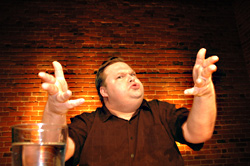When I first met Mike Daisey in 1998, he gave me a lap dance. It wasn’t a pleasant experience.
I’m pretty sure he didn’t realize I was a reviewer, there to critique his first solo show in Seattle, Wasting Your Breath; he was just picking some poor sucker in the audience to writhe his considerable frame against as he recalled an unfortunate moment during the cross-country road trip that took him from a pregnant girlfriend on the East Coast to a new life in Seattle.
But I don’t think it would have slowed him down even if he had known. Daisey’s outstanding quality as a performer is his fearlessness, as demonstrated by Stories From the Atlantic Night Cafe, which he’s bringing to Seattle for one night only at the Capitol Hill Arts Center on Sunday, Feb. 4. It takes guts to do a solo show. But it takes a deep foolhardiness to draw up an outline for a story only an hour before curtain, then use that as the guideline for an evening of extemporaneous entertainment.
What Daisey does is almost singular, and you can hear him squirm with every attempt to give it a title. The worst might be “storyteller”: “It always makes me think of Renaissance fairs,” he muses, “with people drinking mead in crushed velvet.” But solo performer and monologuist don’t find much favor, either. “Ideally, you want to get people past a discussion of what you’re doing so that they’re just listening,” he says.
Daisey was born in New Jersey, raised in Maine, but grew up as an artist in Seattle. He ran the sketch comedy group Up in Your Grill for a couple of years, and helped to found the annual Seattle Sketch Fest. He worked with several fringe companies including Open Circle and Printer’s Devil. And he did humorous and original solo shows in small black boxes, each a deft slice of autobiography. His second piece, I Miss the Cold War, chronicled his romance with le Carré spy tales, the former Eastern bloc, and the woman who became his wife.
Then he enjoyed one of those astonishing moments of luck that only those with quick wits can take full advantage of. He’d put together a show about his experience working for Amazon.com, and the week the show opened, Amazon had its first well-publicized downturn, a series of lay-offs. Suddenly everyone from The Wall Street Journal to the BBC wanted to talk to a disgruntled Amazon employee, and here was Daisey, with 21 Dog Years: Doing Time at Amazon.com, ready to go. Daisey ran the show at the Speakeasy Backroom for several months, then got the opportunity to take it for a professional off-Broadway run at the Cherry Lane Theatre in New York, which is where he’s lived since 2001.
Daisey says Seattle gave him some hard schooling in self-promotion that’s been helpful ever since. “It’s so comfortable out here. You’ve got your favorite coffee shop, and it’s next door to your favorite bookstore, and down the block is your favorite independent cinema, or you can go hiking, or just go home to your cozy sofa and your DVDs. In New York, people are used to going out to see theater. The whole time I was in Seattle, I felt like I was always yanking people out of their couches, going, ‘Come on! Live theater! Come watch!'”
Night Cafe, improvisational and unrefined, has the air of a stunt, but that’s part of why he enjoys doing it. “It’s immediate, and I don’t figure out where the story’s going much before the audience does. Sometimes I think they get there before me. It’s very strange.” Developing the form, which he premiered in New York a couple years ago at P.S. 122, solved a major artistic problem. “I’d just finished 21 Dog Years and was trying to think where my next piece was coming from. I was getting to the point autobiographical monologuists get to, asking: ‘Will I have to live a crazier and crazier life to make good material?'”
So to force himself to seek out personal stories, he decided to create and perform a new piece every week for several weeks, focused on the events of the prior week. “If you change the lenses you use, you realize that life is infinitely full of stories,” he says. “It’s the challenge of every person’s life to make their own lives compelling, so you aren’t bored with yourself.”








